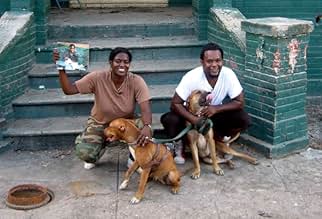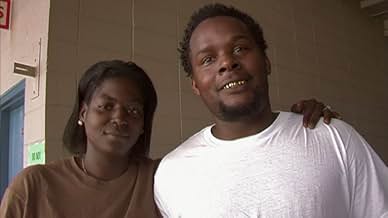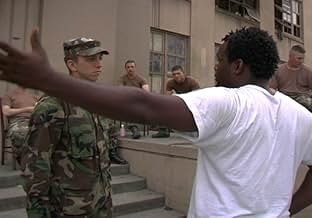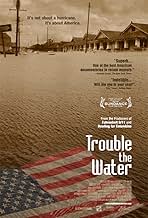Una historia redentora sobre una aspirante a rapera que sobrevive a diques fallidos y un pasado turbulento mientras aprovecha la oportunidad de un nuevo comienzo.Una historia redentora sobre una aspirante a rapera que sobrevive a diques fallidos y un pasado turbulento mientras aprovecha la oportunidad de un nuevo comienzo.Una historia redentora sobre una aspirante a rapera que sobrevive a diques fallidos y un pasado turbulento mientras aprovecha la oportunidad de un nuevo comienzo.
- Nominado a 1 premio Óscar
- 7 premios ganados y 14 nominaciones en total
- Self
- (material de archivo)
- Self
- (material de archivo)
- Self - Reporter
- (material de archivo)
- (as Julie Chen)
- Self
- (archivo de sonido)
- (voz)
- Self
- (material de archivo)
- (sin créditos)
Opiniones destacadas
This is the story as told by the people themselves, not by Anderson Cooper or anyone else. This is how the story should be told because these are the people who lived with it. It's not even a story anyone in uniform could tell because they were part of the problem in New Orleans.
One scene of this documentary allows the locals to narrate how they tried to go to a local Navy base in New Orleans which had been evacuated before the storm. It was empty and it had housing for people which wasn't being used. The National Guard who were protecting the building cocked and loaded M-16s and pointed them at the crowd. Nope, these aren't the stories you hear about on CNN.
You won't hear the story about a man in prison for a misdemeanour before the storm hit either. The television was taken away by the guards before footage of the storm was on the air, when the prisoners finally heard that there was a hurricane outside, they were denied food and most of the guards left.
This is a very good documentary, and an important one because it shows the failings of government. The government doesn't fail everyone, it takes very good care of the rich and businesses, which recovered quicker than anyone else in New Orleans. The government failures are biased towards the poor and visual minorities and this doc. pretty much confirms that thesis.
Four years on and not much has changed in the 9th ward, but the casino is open and the tourism department is showing a flashy video urging people to come to New Orleans. The poor black people aren't around any more, except when they're working for minimum wage. The rest have been displaced from the city where they lived but no longer trust to live in anymore.
Katrina is just one of the legacies of the Bush administration and perhaps a strong indication that the US is a country whose power is in decline. What can you possibly say about a country which won't even help its weakest and most destitute citizen? It sucks.
There are several striking images in the film, including a recording of a 911 call in which an woman requesting help can't get out of her attic which is flooding. The 911 attendant has to inform her that there is no help at this time, and the victim replies, "So I'm going to die?" Silence on the other end of the line.
It seems like the majority of the film is snatched from the video camera of a survivor, as such the footage can be, well, not professional, but in the end it doesn't matter, perhaps even adding to the realism. It turns out that the couple filming is a set of intriguing characters with admirable qualities. They are from the ninth ward, a poor section of New Orleans hit hardest by the storm, yet for those of us without that much contact with society's underbelly or the semi-destitute, they will probably surprise you with their values, intelligence, resolve and resourcefulness.
The strength of the film for me was not in any attempts at blame or inciting anger at a lack of assistance and the seeming complacency of leadership, but in a reflection on the human struggle, manifested through an inspiring family, and in a basic reminder to examine, nourish, and befriend your own community.
This is a magnificent use of home video built in to a rage against poverty and illiteracy and racism. You can blame the victims here all you want, but image after image, scene after scene the plight of being an African American in this country is shoved in their faces...and in ours.
The lives of this family in the Lower 9th Ward are vividly drawn by themselves. When they confront what is outside, i.e., the post-segregation South, we are startled at the condescension, scorn and devaluation of human lives...if your skin is the wrong color.
The people here have no apologies for their lives. They lay it out and I suspect many will resist what struggles they face. But scene after scene, you can't walk away from this film without a better understanding of racism in America.
The stubborn will ask "Why didn't they leave when they were supposed to?" And this film records "How were they supposed to?" and "Where were they going to go?" In the face of it all, those who survive manage here to triumph. While the footage of the disaster is why most people will buy the ticket to see this, it's the struggle to survive, not only Katrina, that will last in the viewer's mind.
Hurricane Katrina, like the September 11 attacks (whose tenth anniversary is in a few days), is something that should always be remembered, maybe more so. It showed how detached the government had become from its most vulnerable citizens. The collapse of the levees and subsequent flooding of the Lower Ninth Ward became an excuse to dismantle New Orleans's public school system and replace it with vouchers. The documentary is even more relevant now, after Louisiana got a second strike in the form of the Deepwater Horizon spill.
¿Sabías que…?
- Citas
elderly woman: The water is steady rising in the attic ma'am and I'm gonna drown in the attic.
9/11 dispatcher: Can you break a hole in the attic?
elderly woman: I tried. I broke a chair for it. I cannot pry this wood off this attic ma'am.
9/11 dispatcher: The police are not coming out until the weather conditions get better.
elderly woman: [long pause] So I'm gonna die.
[long pause]
elderly woman: Hello?
9/11 dispatcher: Yes.
elderly woman: I can't get out.
- Bandas sonorasHurricane Waters
Performed by Citizen Cope
Selecciones populares
- How long is Trouble the Water?Con tecnología de Alexa
Detalles
Taquilla
- Presupuesto
- USD 900,000 (estimado)
- Total en EE. UU. y Canadá
- USD 520,151
- Fin de semana de estreno en EE. UU. y Canadá
- USD 28,606
- 24 ago 2008
- Total a nivel mundial
- USD 522,766
- Tiempo de ejecución1 hora 30 minutos
- Color
- Mezcla de sonido
- Relación de aspecto
- 1.85 : 1
Contribuir a esta página































